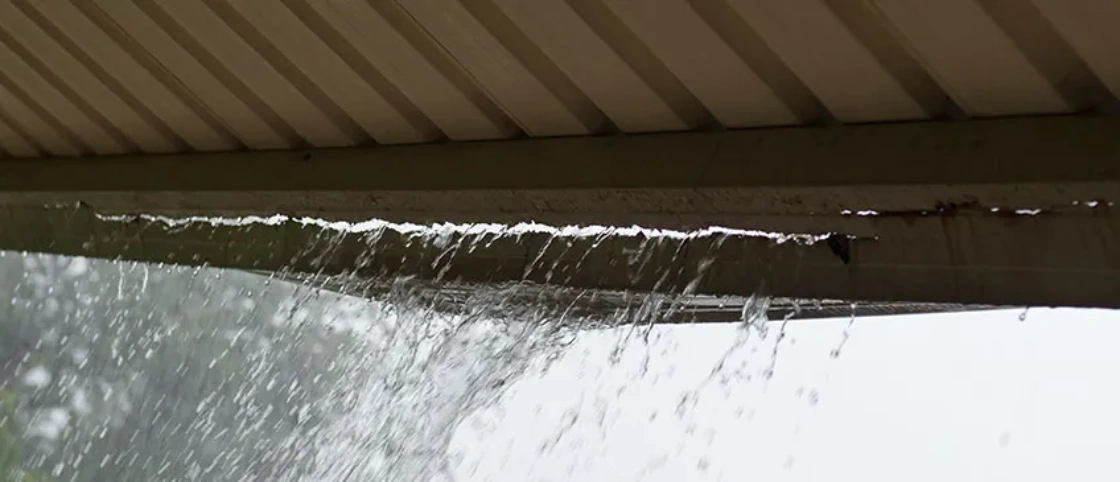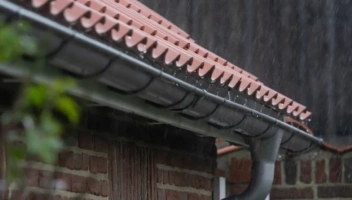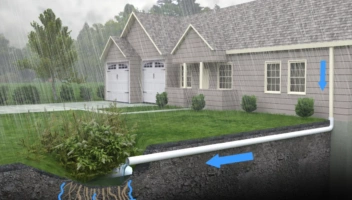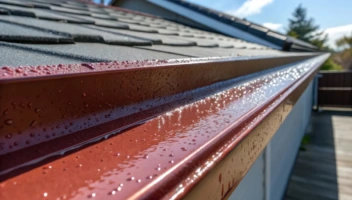6 Signs You Have Clogged Gutters (and How to Fix It)

You may not realize that something small, like clogged gutters, can have such a big impact on your home. Unfortunately, clogged gutters can lead to extensive water damage to your home, ranging from roof leaks to mold growth, basement flood damage, and issues with your home’s foundation.
So preventing your gutters from clogging should be a top priority for every homeowner.

There are several clear signs that indicate it’s time to clean out and unclog your gutters. This article will cover the 6 most important signs of blocked gutters and why gutters are necessary, so you can address problems early and avoid the headaches of the potential water damage they can cause.
We’ll look at what to check for on your home’s roof, gutters, downspouts and around the foundation, as well as how to spot and clear gutter clogs quickly.
In This Article:
- What Happens When Your Gutters are Clogged?
- Signs That Your Gutters are Clogged
- How Do You Unclog Gutters?
- How to Keep Gutters from Clogging
- Frequently Asked Questions
- Final Thoughts on Clogged Gutters
What Happens When Your Gutters are Clogged?

Photo by KarenGiblettPhotography from Shutterstock
When your gutters become clogged, water is unable to properly divert away from your home. Instead, the water will spill over the edge (or lip) of your gutters, which can lead to a cascade of different issues.
- Basement flooding: Clogged gutters lead to overflow and pooling of water around your foundation. This saturates the soil and allows moisture to seep inside the cracks, which causes basement flooding.
- Foundation damage: One of the most significant issues caused by clogged gutters is foundation damage. Water overflowing from clogged gutters can pool around the base of your home. Over time, this water can cause cracks in the foundation, which is expensive to repair.
- Roof damage: Blocked gutters can cause water to back up, which can damage roofing shingles and lead to leaks. Roof and flashing defects are the leading cause of water infiltration into homes, with clogged gutters being a major contributor.
- Pest infestations: Stagnant water and the moist, softened debris in clogged gutters can attract insects and pests like mosquitoes and termites. According to The Centers for Disease Control and Prevention (CDC), clogged gutters can be potential breeding sites for mosquitoes, which can spread diseases like West Nile Virus, Zika, and others.
- Ice dams: In colder climates, clogged gutters can exacerbate problems with ice dams, which form when heat from inside a home escapes into the attic and warms the roof, causing snow to melt and refreeze at the roof’s edge. If gutters are clogged, the water from melting snow and ice can’t flow through and divert away from your home. Ice dams can cause significant damage to roofs.
- Siding damage: Constant overflowing water can also lead to damage to the siding of a home, as well as the potential for wood rot.
- Health hazards: The US Department of Housing and Urban Development (HUD) reported that clogged gutters can be a health hazard, noting that “improper drainage, including clogged gutters” can lead to mold and mildew growth.
- Safety hazards: In winter, clogged gutters can cause icicles to form, which can be a hazard if they fall and hit a person or even a pet. Moreover, the added weight of debris, water, and ice can cause gutters to pull away from the house or collapse.
- Landscape damage: Overflowing water from blocked gutters can lead to soil erosion and damage plants and shrubs located directly beneath the gutters.
These issues not only impact the health, safety, and appearance of your home, but they can also get expensive. The average cost of repairing water damage due to clogged gutters can range from hundreds to thousands of dollars, depending on the extent.
According to research from HomeAdvisor, the average water damage repair bill in 2022 was $3,600.
The best way to avoid these costly problems is to check your rain gutters (or eavestroughs) frequently and pay close attention to the following important signs you need gutter guards.
Signs That Your Gutters are Clogged
- You Spot Animals or Pests Around Your Gutters

Photo by Fabrique Imagique from Shutterstock
If you are noticing animals or pests scurrying around your gutters, this can be a big sign your gutters are clogged. Birds and squirrels find gutters to be a convenient place to make a nest, and those nesting materials can easily block your gutters.
- Water is Spilling Over the Sides

Photo by ungvar from Shutterstock
If you notice water spilling over the sides of your gutters, it’s a sure sign you have clogged gutters. The obstruction can force water over the edge of your gutters and down your siding, where it can infiltrate your walls and foundation, leading to expensive water-related damage.
So if you ever notice your basement flooding during a rainstorm, blocked gutters may be to blame, causing water to divert into your home’s basement.
- Sagging Gutters

Photo by VPales from Shutterstock
Sagging gutters are another common sign that your gutters are clogged. The weight of the leaves, shingle grit, pine needles, and other debris can cause your gutters to bend and sag. Unfortunately, clogged, sagging gutters will be ineffective at carrying water away from your home.
If enough debris remains in your gutters for long periods of time, the excess weight will begin to wear on the gutter itself. Your gutters can even begin pulling away from your home, causing even more issues and homeowner headaches.
- Stains on Your Home’s Siding

Photo by Indy Edge from Shutterstock
Any signs of staining on the siding of your home is a sign that there’s standing water in your gutter system. Stagnant rainwater could end up causing costly damage to the fascia boards behind the gutters and on the shingles of your roof.
- Plant Growth

Photo by Stacy Ellen from Shutterstock
Have you ever looked up and noticed a garden in your gutter? This is an obvious sign of clogged gutters. Seeds can accumulate in your gutters along with dirt and debris, allowing a gutter garden to form.
Plant growth is a glaring sign that your gutters need to be cleaned out. Foam gutter guards are notorious for encouraging plant growth inside your gutters.
- You Don’t Remember the Last Time You Cleaned

Photo by SpeedKingz from Shutterstock
If you can’t remember the last time you climbed the ladder to clean out your clogged rain gutters, it’s likely that they’re in need of a serious cleaning. Your gutter system should be cleaned out each season to ensure your home is properly protected against expensive water-related damage that can result from clogged gutters.
How Do You Unclog Gutters?

Photo by Virrage Images from Shutterstock
Unclogging blocked gutters is essential maintenance for every home. There are several effective methods for clearing debris out of gutters, which range from tackling minor clogs yourself or hiring a local professional.
These are the 8 best methods for clearing gutter blockages.
- Use a gutter scoop to remove debris by hand
- Flush gutters with a garden hose on a high pressure setting
- Try a plastic gutter cleaning wand to dislodge and scrape out debris
- Attach a gutter cleaning attachment to a wet/dry vac to suction out debris
- Try a drain auger (drain snake) to break up compacted debris
- Check downspouts and elbows for blockages preventing drainage
- Rinse gutters and downspouts thoroughly after clearing debris
- Hire a professional gutter cleaning service for chronic issues
Whether you’re DIYing gutter clogs or you’re hiring a gutter cleaning company, it’s critical that you stay on top of gutter maintenance.
Keeping clogs from forming inside your gutters means that you prevent the extensive water damage clogged gutters may cause and avoid expensive home repairs.
How to Keep Gutters from Clogging

Photo by ESB Professional from Shutterstock
The single best method to avoid clogged gutters (and the damage they can cause) is to prevent your gutters from becoming blocked in the first place. In terms of how to keep your gutters clog-free, there are a variety of options.
- Install gutter guards to keep out debris. There are various types of gutter guards, from foam filters to perforated metal that allow water to flow while blocking pine needles, leaves, and other debris from entering your gutters.
- Use gutter brushes or rubber strips that sit inside the gutter to direct water under them while preventing buildup on top.
- Regularly clean out gutters every spring and fall, more often if you have overhanging trees. This removes debris before it accumulates.
- Make sure gutters have proper slope and pitch to keep water moving efficiently. A slight tilt (about ¼ to ½ inch for every 10 feet of gutters) allows proper drainage. For long gutter sections, a pitch from the middle of the gutter towards a downspout at each end works best.
- Check that all downspouts and elbows are clear of debris so water can exit the system freely. For more read “How to Clean Gutter Downspouts.”
- Trim back overhanging tree limbs to prevent leaves from accumulating in and creating clogs inside your gutters.
- Avoid growing climbing vines on your home which can shed debris into gutters.
- Consider installing larger gutters that are less likely to get congested. (However, it’s still important to keep them free of debris.)
- Divert rainwater from downspouts away from the home’s foundation.
Along with regular gutter maintenance, these methods are your best options to eliminate gutter clogging issues.
But the single most effective way to keep gutters from clogging is LeafFilter Gutter Protection. It installs on top of your existing gutters, preventing debris, leaves, shingle grit, pine needles – everything but water – from entering and creating clogs inside your gutters.
With a limited lifetime transferable warranty, you’ll worry less about cleaning out your gutters again.
Learn more about our product or call us at 800-290-6106 for a free estimate and gutter inspection!
Frequently Asked Questions

Photo by Stephen Reeves from Shutterstock
How often should I clean out my gutters to prevent clogs?
We recommend cleaning out your gutters at least twice a year, ideally in the spring and fall. However, if you have a lot of trees near your home, more frequent cleaning may be necessary.
How do you fix gutters that don’t drain?
To fix gutters that don’t drain properly, follow these steps:
- Gutter guards: Consider gutter guards to prevent future clogs.
- Clear debris: Remove leaves and debris from the gutters and downspouts.
- Check downspouts: Ensure downspouts are clear, using a plumber’s snake or hose if needed.
- Reposition gutters: Adjust the gutter slope to encourage water flow.
- Repair leaks: Seal leaky gutters with gutter sealant or caulk.
- Install extensions: Add gutter extensions to direct water away from the foundation.
- Regular maintenance: Maintain gutters at least twice a year to prevent issues.
Can clogged gutters damage my home?
Yes, clogged gutters can lead to significant water damage. Water overflow can cause foundation issues, basement flooding, and even damage to your roof, siding, and landscaping.
Can I clean my gutters myself, or should I hire a professional?
You can clean out your gutters yourself if you have the necessary gutter cleaning tools and are comfortable working on a ladder. However, hiring a professional gutter cleaning service is often safer and more efficient, especially for multi-story homes.
Do gutter guards prevent clogs?
Gutter guards can help prevent clogs by keeping larger debris out of the gutters while allowing water to flow through. However, depending on the type of gutter guards, some maintenance may still be necessary to remove smaller debris that can accumulate on top of the gutter guards.
How much does it cost to hire a professional gutter cleaning service?
The cost of professional gutter cleaning can vary depending on the size of your home and the level of clogging. On average, gutter cleaning costs between $119 and $227 per cleaning session.
Can clogged gutters attract pests or rodents?
Yes, clogged gutters can become a breeding ground for pests like mosquitoes and attract rodents seeking shelter. Keeping your gutters cleaned out can help prevent these issues.
Is gutter maintenance covered by homeowner’s insurance?
Generally, homeowner’s insurance does not cover routine gutter maintenance. However, if clogged gutters lead to significant damage, such as water intrusion or structural issues, those damages may be covered.
Who can I hire in my area to get my clogged gutters cleaned?
If your gutters are clogged and they need to be cleaned out, check out one of these nearby locations:
- Gutter cleaning in Richmond, Virginia
- Gutter cleaning in Columbus, Ohio
- Gutter cleaning in Raleigh, North Carolina
- Gutter cleaning in Cincinnati, Ohio
- Gutter cleaning in Louisville, Kentucky
- Gutter cleaning in Atlanta, Georgia
- Gutter cleaning in Greenville, South Carolina
- Gutter cleaning in Nashville, Tennessee
Final Thoughts on Spotting and Preventing Clogged Gutters
Remember that maintaining your gutters is essential to protect your home from potential water damage caused by clogs. Regular inspections and gutter cleaning will prevent costly repairs down the road.
Additionally, clogged gutters can lead to a variety of problems for homeowners, such as mold and mildew growth, which can create safety hazards and cause potential health issues for your family. So it’s important to keep your gutters from clogging.


